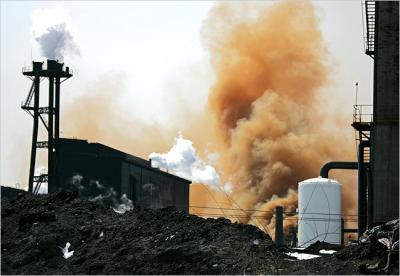In 2006, China burned more than twice as much coal as any other country, according to a Vital Signs Update released today by the Worldwatch Institute. China’s coal use amounted to 39 percent of the global total, followed by the United States with 18 percent. The European Union and India came in third and fourth place, accounting for 10 percent and 8 percent of total coal use, respectively.
Coal accounted for a quarter of the world’s primary energy supply in 2006 and supplied nearly a third (32 percent) of all fossil fuel-based energy. Due to its high carbon content, however, coal was responsible for approximately 40 percent of global carbon dioxide emissions from fossil fuels.
The demand for coal is growing rapidly in China, which accounted for more than 70 percent of the global growth in coal use in 2006 and for more than 60 percent of the rise in coal use over the past decade. India, responsible for just over 10 percent of the growth in world coal use in the last 10 years, ranks a distant second.
Growing acknowledgment of the health, climate, and other environmental impacts of coal use has led to mounting political opposition to new coal-fired power plants in the United States and Europe. But the uncertainty about coal’s future in industrial countries is overshadowed by its dominance in the energy mix of large developing economies. In both China and India, coal maintains a preeminent role in plans to meet the projected rapid growth in energy demand.
A true reconciliation of coal with the climate risk it presents must soon confront coal-fired power not only in the United States and other industrialized countries, but also on its new home turf in rapidly industrializing developing countries.

I agree. I personally think that nuclear technology has come a long ways. For example, so-called “fast” reactors, as well as “pebble bed” designs are far, far safer. Heck, look at France, a country that derives 90% of its power from nuclear sources.